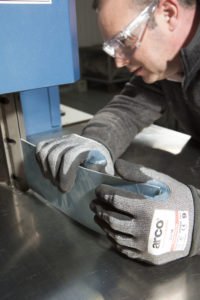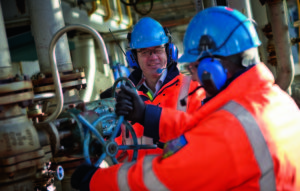PPE Regulation
‘New PPE Regulations see the most significant change in 20 years’: In conversation with Neil Hewitt, Arco
SHP recently caught up with Neil Hewitt, Divisional Director of Quality and Technical Standards at Arco, to find out about the introduction of new PPE legislation and what everyone in the supply chain must now do in order to be compliant with the regulation.
The PPE Regulation has been in a transitional period since 2016, but is now set to be fully enforced. Please tell us a little more about the new Regulations.
 Neil Hewitt (NH): “The new PPE Regulation (EU) 2016/425 brings about the most significant changes to the rules surrounding PPE, since the introduction of the first Directive over 20 years ago. The changes are designed to improve ownership of those in the supply chain by clearly defining their legal obligation. As well as to strengthen the product type approval process, improve market surveillance and increase the requirements on certain PPE categories such as hearing protection, due to the potential for life changing injuries”.
Neil Hewitt (NH): “The new PPE Regulation (EU) 2016/425 brings about the most significant changes to the rules surrounding PPE, since the introduction of the first Directive over 20 years ago. The changes are designed to improve ownership of those in the supply chain by clearly defining their legal obligation. As well as to strengthen the product type approval process, improve market surveillance and increase the requirements on certain PPE categories such as hearing protection, due to the potential for life changing injuries”.
When did the Regulation enforcement come into effect?
(NH): “The transition requirements came into force on 21 April 2018, meaning all those responsible for the purchase of PPE must now ensure that their suppliers are able to meet the new regulatory requirements. The transitional period lasts for one year and means that until 21 April 2019 both the old Directive and the new Regulation will remain valid. Therefore, any products CE marked under Directive 89/686/EEC, can still be available on UK markets until 2019. However, products with an EC type-examination certificate will remain valid until 21 April 2023, unless the state of the art or standard has changed, the certificate expires before that date or changes have been made to the products safety features.”
Safety managers should be fully prepared for the enforcement, but what is the biggest change they are going to notice?
(NH): “There are a number of changes that will affect safety managers including the shift of responsibility within the supply chain. From April this year, everyone involved in the manufacture, supply and distribution of PPE, is now referred to as ‘Economic Operators’ and are legally responsible to ensure products comply with standards. This will also include online retailers, retailers and generalist distributors who will need to assess the products compliance before making it available. Under the Regulation this is a clearly defined obligation and cannot be passed back into the supply chain.
“It’s important for safety managers to note that they will still be able to procure PPE in accordance with the old Directive until 21 April 2023 using a current EC type examinations certificate, however, the product must be compliant with the requirements of the regulation and an EU declaration of conformity must be available either with the product or at an identified website. If the certificate expires earlier than 21 April 2023 then the products must be removed from the market or recertified to the new Regulation. There are three exceptions to this position that will require all newly imported products after 21 April 2019 to be recertified to the new PPE regulation that those responsible for the purchase of PPE should be aware of:
1) Products where there has been a change in design or manufacture since their last EC Type Examination – ask your supplier for new certification;
2) Products where there has been a change in the state of the art or standards, always check to see if you are buying PPE to the most current standard. Gloves, for example;
3) Products that have changed category under the new Regulation. Check that the PPE which is now classified as CAT III is now recertified to the regulation. Hearing protection, for example.”
How will the changes affect the relationship between safety managers and PPE manufacturers?

(NH): “The new regulation shouldn’t impact the relationship between safety managers and PPE manufacturers, however, purchasers should take a proactive approach to ensure the products they are purchasing for their workforce are compliant and meet all the regulatory requirements. If safety managers have purchased products to standards that have now been superseded, they will need to know what new product they have to purchase and any new assessments that need to be carried out.”
Until now it has only been a Directive, what are the penalties for not adhering to the rules once it is reclassified as a Regulation?
(NH): “The Regulation hasn’t applied any new duties to those purchasing PPE for use within their organisation, they are still legally required to adhere to the PPE at Work Regulations 1992.
“What’s more, apart from who the responsibility lies with there have been no changes to the penalties for not adhering to the Regulation. If an economic operator is found guilty of an offence under these Regulations, they could face large fines of up to £5,000 and/or even imprisonment for a term not exceeding three months. Manufacturers may also be required to recall and replace faulty product so the actual costs of non-compliance may be very much higher.
“Additionally, non-compliance may only be noticed after an accident or other incident in which case the manufacturer is very likely to also face civil or criminal proceedings resulting from the injuries sustained by the user.”
What can organisations do to ensure the suppliers they are using meet the new Regulations?
(NH): “To ensure Arco’s customers understood the changes, we ran an advisory campaign, which included three simple but crucial steps that purchasers of PPE should be asking suppliers to do:
- Provide a Declaration of Conformity that shows original certification for the PPE you are purchasing;
- Define their process for ongoing sample testing to ensure safety products continue to meet the required standards;
- Define their process of quality assurance at the manufacturing facility to ensure the products are being manufactured as they were originally certified.
“The main piece of advice, however, is to ensure you are using a reputable supplier.”
Is there a way to tell that a product is compliant with the Regulations?

(NH): “Under the new Regulation, an EU Declaration of Conformity must either accompany each item of PPE or a web link to the digital version must be clearly shown on the product or user instructions. If the item you’re purchasing doesn’t include this, ask your supplier immediately. If you have any doubts, ask you supplier to define their process for ongoing sample testing and quality assurance – it’s their responsibility to ensure the product they are supplying is compliant.”
The new Regulation governs the entire supply chain. What does that mean for distributors like Arco?
(NH): “For distributors like Arco, the new regulation brings added responsibility including checking the manufacturer’s instructions; ensuring the Declaration of Conformity is correct and arranging safe transport, as well as the requirement to be technically competent to assess a product before offering it for sale and having a robust system in place for situations where doubt has arisen about the safety characteristics of the item. What’s more, distributors have a responsibility to work closely with the competent authority such trading standards or the HSE to support them when they become aware of potential issues.
“As a safety expert and with the investment Arco has made in product assurance and in its own Product Assurance Laboratory, the company is well placed to meet the new obligations and to assure customers that they are buying from a reliable, fully compliant supplier.”
‘New PPE Regulations see the most significant change in 20 years’: In conversation with Neil Hewitt, Arco
SHP recently caught up with Neil Hewitt, Divisional Director of Quality and Technical Standards at Arco, to find out about the introduction of the new PPE Directive and what everyone in the supply chain must now do in-order to be compliant.
Ankit Kumar
SHP - Health and Safety News, Legislation, PPE, CPD and Resources Related Topics
Company fined as worker has leg amputated
Aviation company fined after worker death at Heathrow Airport
Gogglebox star George Gilbey died after fall through skylight

 Neil Hewitt (NH): “The new PPE Regulation (EU) 2016/425 brings about the most significant changes to the rules surrounding PPE, since the introduction of the first Directive over 20 years ago. The changes are designed to improve ownership of those in the supply chain by clearly defining their legal obligation. As well as to strengthen the product type approval process, improve market surveillance and increase the requirements on certain PPE categories such as hearing protection, due to the potential for life changing injuries”.
Neil Hewitt (NH): “The new PPE Regulation (EU) 2016/425 brings about the most significant changes to the rules surrounding PPE, since the introduction of the first Directive over 20 years ago. The changes are designed to improve ownership of those in the supply chain by clearly defining their legal obligation. As well as to strengthen the product type approval process, improve market surveillance and increase the requirements on certain PPE categories such as hearing protection, due to the potential for life changing injuries”.

Really helpful. Thank you.
Insurance industry quotes that claims for noise induced hearing loss is fastest growing area.
Hardly surprising no-win no-fee on the case after the 2011 Baker v Quantum Clothing and Ors retrospective appeal court decision finding that simply compliance with existing “work exposure limits” insufficient when it should have been known that the risk was not being effectively mitigated. Can’t wait to see what will happen when work-stressors are included as an “industrial injury” as, the fur is gonna hit the fan when DSE operators start retrospective claims for eye-strain, CVS, Screen fatigue and the RSI’s under the WHO ICD heading of Asthenopia a condition not currently covered under employers liability insurance and the employer… Read more »
A good informative article, this change is geared towards Manufactures, Importers, Authorised Representatives and Distributors as indicated, however, the statement below indicates that the safety manager/purchaser has some responsibility, when “not to standard” product shouldn’t be on the market in the first place: “The new regulation shouldn’t impact the relationship between safety managers and PPE manufacturers, however, purchasers should take a proactive approach to ensure the products they are purchasing for their workforce are compliant and meet all the regulatory requirements. If safety managers have purchased products to standards that have now been superseded, they will need to know what… Read more »
Quite helpful insight for a major supplier of PPE to industry in a country where there are virtually no PPE Directives and Policy to protect workers.